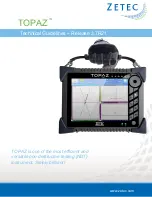
Messenger W
User Manual
6
9M02-7000-A001-EN
Version A
Some of the conditions on which notifications can be sent to the host server are listed below:
•
Any monitored value exceeding a predefined or user-defined limit
•
A digital input changing state (on/off)
•
A digital output changing state
•
An analog input transitioning into a warning or alarm region
•
A scheduled update
•
System faults
•
SMS text commands from a user or host server
•
Power on or reset
1.3.1 Event Codes
Every message sent by the Messenger W to a host-based server application is triggered by an event. The event
generates a message and the message contains an Event Code. The Event Code uniquely identifies to the
server the reason the message is being sent. Some of the messages generated contain data; others serve
simply as notification that a particular event has occurred.
1.3.2 Store and Forward Data Queue
There are several scenarios where a message may not be deliverable – network down, host server down
and poor connectivity, to name a few. In the event that a message cannot be delivered, it is stored in
memory and is continually re-sent until it is properly acknowledged. This store and forward memory is non-
volatile and remains intact during power off.
1.4 Specifications
Power Input:
8-32 VDC
50 mA @ 24 VDC
Reverse polarity protection
Overvoltage protection
Externally fused
Digital Outputs:
Transistor switch to ground (current sink)
2 A @ 24 VDC
Current limited
Overvoltage protection
Digital Inputs:
Two modes of operation (user selectable): voltage input or ground input
Current limited
Overvoltage protection
Analog Input:
10-bit ADC
Accuracy: +/- 2% FS
Input ranges (user selectable): 0-1 V, 0-5 V, 0-10 V, 0-20 mA





































